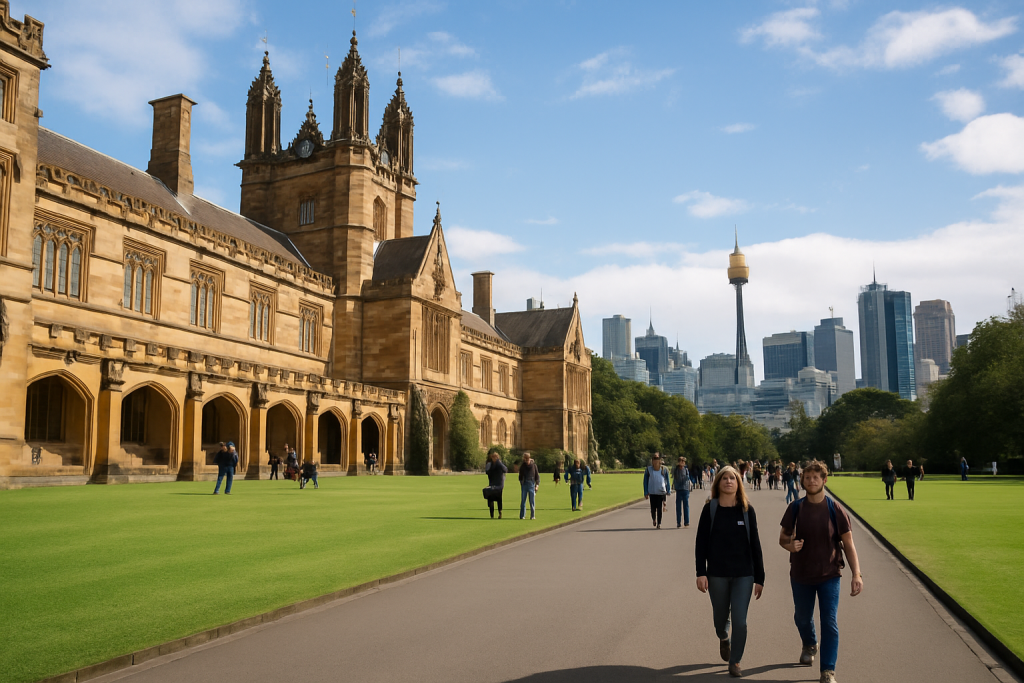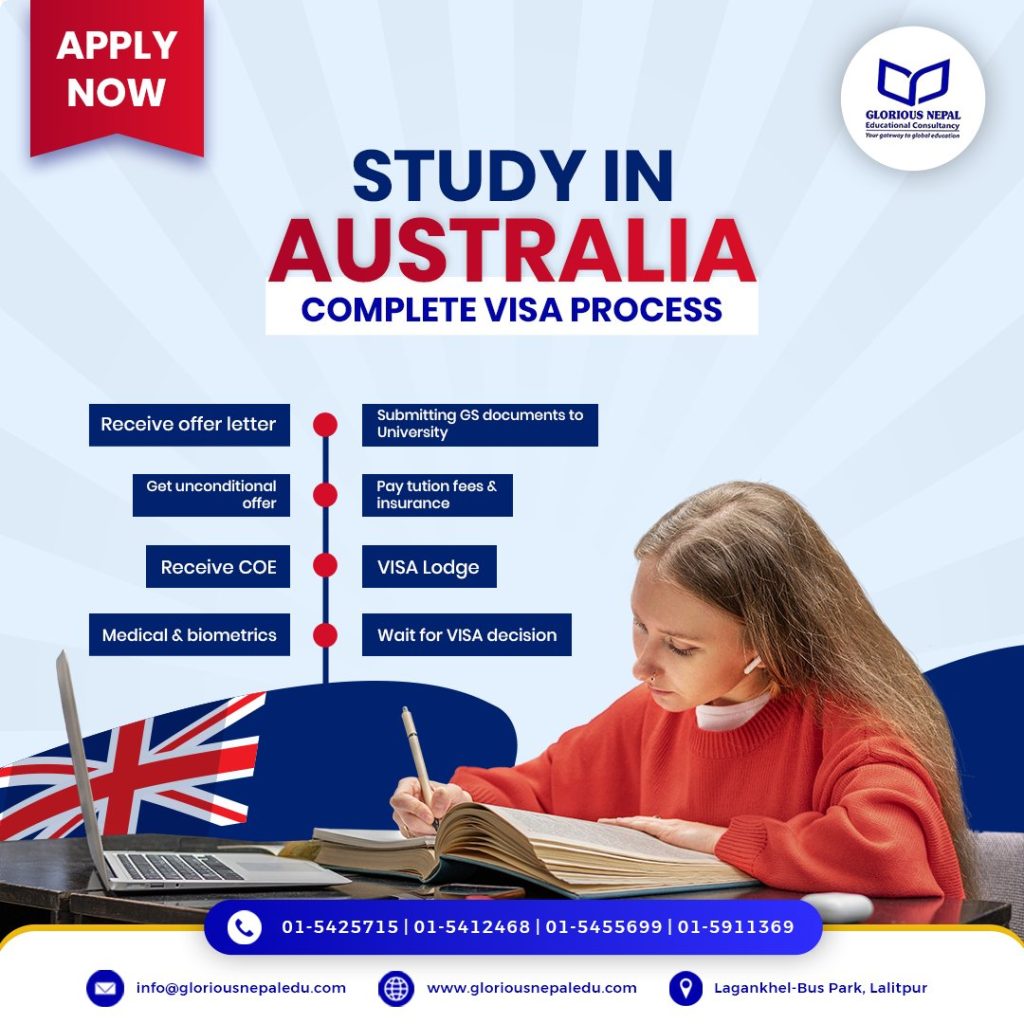01-5425715 / 5412468
Australia
- Glorious Nepal Educational Consultancy
- Australia
Empowering Students for Global Success through Trusted Guidance
At Glorious Nepal Educational Consultancy Pvt. Ltd., we believe that education is more than a degree it’s a journey toward a better life and a brighter future. As Nepal’s trusted and experienced partner in academic and career counseling, we are proud to support students who aspire to pursue their studies in Australia a country known for its outstanding education system, inclusive culture, and vast career potential.
STUDY IN AUSTRALIA
Australia is a vibrant, modern, and democratic country that offers much more than just an education it offers an experience of a lifetime. Renowned for its world-class universities, high-quality healthcare system, and breathtaking natural landscapes, Australia provides the perfect blend of academic excellence and lifestyle.
For international students, especially from Nepal, studying in Australia is a gateway to global knowledge, diverse cultural experiences, and exciting career prospects. Whether it’s the country’s dynamic and inclusive society, its relaxed yet ambitious lifestyle, or its cutting-edge educational resources, Australia creates an environment where students can truly thrive both academically and personally.
From world-renowned cities like Sydney and Melbourne to regional campuses surrounded by nature, Australia offers a unique setting where learning goes far beyond the classroom. With its strong commitment to innovation, student support, and global employability, Australia stands out as an ideal destination for those who aim to shape a successful future on the world stage.
Key Facts About Studying in Australia
Considering studying in Australia from Nepal?
Here’s a concise and informative overview to help you understand the essentials of planning your academic journey in one of the world’s most popular study destinations.
Language of Instruction
Here’s a concise and informative overview to help you understand the essentials of planning your academic journey in one of the world’s most popular study destinations.
Tuition Fees
The cost of studying in Australia varies depending on the program and institution:
- Undergraduate Programs: AUD 20,000 – AUD 45,000 per year
- Postgraduate Programs: AUD 22,000 – AUD 50,000 per year
Funding Options
Students have access to a range of funding sources, including:
- Merit-based and need-based scholarships
- Personal or family savings
- Part-time employment during studies
- Educational loans from banks and financial institutions
- Sponsorships from government or private organizations
Language Proficiency Exams
To meet entry requirements, students must take one of the approved English proficiency tests, such as:
- IELTS (International English Language Testing System)
- TOEFL (Test of English as a Foreign Language)
- PTE Academic (Pearson Test of English)
Types of Degrees Available
Australian institutions offer a wide range of academic pathways:
- Undergraduate Degrees (Bachelor’s)
- Postgraduate Degrees (Master’s)
- Doctoral Programs (PhD)
- Vocational Education and Training (VET) Courses
Academic Intakes
The two main intakes for most universities and colleges are:
- February/March
- July/August
Some institutions may also offer rolling or additional intakes depending on the program.
Let us help you turn your academic dreams into reality.
Student Visa
To study in Australia, international students must apply for a Student Visa (Subclass 500), which allows full-time study in a recognized educational institution.
If you’re planning to pursue your higher education in Australia from Nepal, this information is your starting point. For personalized guidance, application support, and expert advice, connect with Glorious Nepal Educational Consultancy Pvt. Ltd. your trusted partner in global education.
Let us help you turn your academic dreams into reality.
Top Courses to Study in Australia
Australia is home to some of the world’s leading universities, attracting ambitious students from across the globe. With a strong emphasis on innovation, hands-on learning, and career readiness, the country offers academic programs that align with today’s global job market.
Here are some of the most sought-after courses that international students especially from Nepal frequently choose:
1. Engineering
From civil and mechanical to electrical and mining engineering, Australia offers cutting-edge programs backed by advanced research and real-world application. Graduates are highly valued in industries worldwide for their practical skills and problem-solving abilities.
2. Business, Commerce & Management
Australia’s business schools are globally recognized for their quality. Whether you’re aiming for a career in international trade, entrepreneurship, or corporate management, business-related degrees provide a solid foundation and global exposure.
3. Information Technology (IT)
With a booming tech industry and strong demand for IT professionals, studying computer science, software development, or data analytics in Australia opens doors to a future-proof career.
4. Healthcare & Nursing
Known for its world-class healthcare education, Australia trains students in nursing, public health, and allied health sciences through programs that blend theory, clinical training, and research.
5. Accounting & Finance
Australia’s robust financial sector and international curriculum make it a top destination for students pursuing careers in accounting, auditing, banking, or financial planning.
6. Hospitality & Tourism Management
A leader in hospitality education, Australia is the perfect place to study hotel management, tourism, or event planning. Its thriving tourism industry offers students hands-on experience and global opportunities.
These programs not only offer academic excellence but also strong employability outcomes, both within Australia and internationally. Choosing the right course is a crucial step, and at Glorious Nepal Educational Consultancy Pvt. Ltd., we’re here to help you make the best decision for your future.
Top Australian Universities Popular Among Nepali Students
Studying in Australia opens the door to globally recognized degrees, diverse cultural experiences, and exceptional career opportunities. For Nepali students, the country offers a welcoming environment, strong community support, and a wide range of programs tailored to meet today’s career demands.
Below is a curated list of well-known Australian universities that are especially popular among students from Nepal, along with their locations and popular courses.


University Name |
| Popular Courses for Nepali Students | Key Highlights |
La Trobe University |
| Nursing, Biomedical Science, Business & Management | Strong focus on research, sustainability, and regional education |
Charles Sturt University |
| Education, Business, Healthcare | Affordable tuition, personalized learning, supportive environment |
Western Sydney University |
| IT, Engineering, Hospitality | Industry-aligned programs, diverse student community |
Australian Catholic University (ACU) |
| Education, Nursing, IT, Business | Emphasis on values-based education, high employability rates |
Murdoch University |
| Environmental Science, IT, Social Sciences | Hands-on learning, flexible entry pathways |
CQUniversity Australia |
| Engineering, IT, Education, Health | Affordable regional campuses, excellent support for international students |
University of Southern Queensland |
| Education, Engineering, Allied Health | Strong distance learning options, great regional setting |
Torrens University Australia |
| Business, Design, IT | Industry-focused curriculum, modern facilities |
Southern Cross University |
| Tourism, Environmental Science, Business | Excellent programs in hospitality and sustainability |
University of Adelaide |
| Engineering, Science, Business | One of Australia’s oldest universities, strong research profile |
University of Technology Sydney (UTS) |
| Engineering, IT, Business | High graduate employability, innovative teaching |
Macquarie University |
| Finance, Actuarial Science, IT | Strong business and finance programs, modern campus |
University of Wollongong |
| Engineering, IT, Business | Excellent research facilities, beachside location |
University of Newcastle |
| Engineering, Health Sciences | Affordable living, great academic support |
Victoria University |
| Business, IT, Health Sciences | Flexible entry programs, strong links with industry |
University of Tasmania |
| Marine Science, Environmental Science, Engineering | Unique programs, stunning natural surroundings |
Flinders University |
| Health Sciences, Education, Engineering | Practical experience through clinical placements and internships |
Why These Universities Are Ideal for Nepali Students
- Course Diversity: From healthcare to IT, engineering, and environmental science—students can pursue the fields most in demand globally and in Australia.
- Regional Campus Benefits: Many institutions offer regional campuses with lower living costs, smaller class sizes, and potential visa advantages.
- Scholarships and Support: Numerous universities provide scholarships specifically for international and Nepali students, including merit-based, need-based, and early-bird awards.
- Post-Study Opportunities: Graduates benefit from Australia’s strong post-study work visa options and employer demand for skilled workers.
Ready to Begin Your Journey?
Choosing the right university is the first step toward shaping your global future. At Glorious Nepal Educational Consultancy Pvt. Ltd., we help you navigate every stage from selecting the best-fit institution to securing your visa and settling in Australia.
Requirements to Study in Australia
Planning to study in Australia from Nepal? To begin your academic journey in one of the world’s most desirable education destinations, it’s important to understand the key requirements that ensure a smooth application and visa process
1. Academic Admission Requirements
To gain admission to a recognized Australian institution, students must meet the specific academic criteria set by the university or college. These requirements vary based on the course level (undergraduate, postgraduate, or vocational) and the field of study. Generally, institutions assess your previous qualifications, academic transcripts, and overall performance to determine your eligibility.
2. English Language Proficiency
Since English is the primary medium of instruction in Australia, international students are required to demonstrate English language competency. This is typically proven through standardized tests such as:
- IELTS
- TOEFL
- PTE Academic
Minimum scores vary by institution and program, so it’s important to check the specific requirements of your chosen course.
3. Financial Capacity
To study in Australia, you must show evidence that you have the financial means to support yourself throughout your stay. This includes:
- Tuition fees for the duration of your course
- Living expenses (accommodation, food, transport, etc.)
- Overseas Student Health Cover (OSHC)
Having clear documentation of your financial stability is crucial for both university admission and your student visa application.
4. Genuine Temporary Entrant (GTE) Statement
The GTE requirement ensures that your intention to study in Australia is genuine and temporary. When applying for a Student Visa (Subclass 500), you’ll need to submit a written statement explaining your motivation for studying in Australia, your course choice, and your plans after completing your studies including your intention to return to Nepal.
A well-written GTE statement helps demonstrate your sincerity and strengthens your visa application.
Ready to Start Your Application?
At Glorious Nepal Educational Consultancy Pvt. Ltd., we help you prepare every document and requirement with precision ensuring that your academic journey to Australia starts with confidence and clarity.
Reach out to us today for expert guidance on choosing the right course, preparing your documents, and fulfilling all requirements for studying in Australia.
Intakes to Study in Australia
Australian universities offer multiple intakes throughout the year, providing flexibility for international students to begin their studies at a time that suits their academic and personal goals. The two main intakes Semester 1 and Semester 2 are the most popular among Nepali students, with a smaller Summer intake available at select institutions.
Intake | Study Period | Typical Application Window |
Semester 1 | February to June | August to November (Previous Year) |
Semester 2 | July to November | December to April (Same Year) |
Summer | December to February | May to July (Same Year) |
Which Intake Should You Choose?
- Semester 1 is the most common and widely available intake, with the highest number of courses and scholarships on offer.
- Semester 2 offers another excellent opportunity to begin your studies without waiting an entire year.
- Summer Intake (available at select institutions) is ideal for students looking to fast-track their studies or start niche or trimester-based programs.
Plan Ahead for a Smooth Journey
Applying early is key especially if you’re aiming for competitive programs or scholarships. At Glorious Nepal Educational Consultancy Pvt. Ltd., we’ll help you choose the right intake based on your goals, academic readiness, and visa timeline.
Get in touch today to secure your place at top Australian universities.
Cost of Studying in Australia
Studying in Australia is a rewarding investment in your future but understanding the total cost of education is crucial for planning your academic journey wisely. From tuition fees to living expenses and health insurance, here’s what you need to know to budget effectively.
Expense Category | Estimated Cost Range (AUD) |
Tuition Fees | AUD 20,000 – AUD 45,000 per year (Undergraduate) |
Living Expenses | AUD 20,000 – AUD 27,000 per year (varies by city and lifestyle) |
Overseas Student Health Cover | AUD 500 – AUD 800 per year (based on coverage length and provider) |
Study Materials & Other Costs | Varies depending on your course, institution, and personal needs |
What’s Included in Living Costs?
Living expenses typically cover:
- Accommodation (shared apartments, hostels, or homestays)
- Food and groceries
- Transport (public or personal)
- Utility bills (electricity, internet, mobile)
- Personal expenses (entertainment, clothing, etc.)
Major cities like Sydney and Melbourne tend to have higher costs, while regional areas and smaller cities often offer more affordable living options.
Planning Ahead for Peace of Mind
Proper budgeting ensures you can focus on your studies without financial stress. Alongside personal savings, students can explore:
- Scholarships
- Educational loans
- Part-time work opportunities (up to 48 hours per fortnight during study periods)
Need Help Structuring Your Expenses?
At Glorious Nepal Educational Consultancy Pvt. Ltd., we help you estimate your total cost of education based on your course, location, and lifestyle so you can plan with clarity and confidence.
Scholarships to Study in Australia
Here’s a list of key scholarships you can explore:
1. Australia Awards Scholarships
Funded by the Australian Government, these prestigious scholarships cover full tuition fees, return airfare, living expenses, health insurance, and more. They are designed to develop leadership skills and strengthen ties between Australia and partner countries, including Nepal.
2. Endeavour Postgraduate Scholarship
Offered to high-achieving international students pursuing postgraduate studies, this scholarship includes tuition, travel, establishment allowance, and a monthly stipend.
3. International Postgraduate Research Scholarships (IPRS)
Available for international students undertaking research-based postgraduate programs, IPRS covers tuition fees and health insurance. It is especially valuable for students pursuing master’s by research or PhDs.
4. Research Training Program (RTP) Scholarships
Funded by the Australian Government and administered by universities, RTP scholarships support both domestic and international students enrolled in postgraduate research degrees. They usually cover tuition and living costs.
5. University-Specific Scholarships
Most Australian universities offer a range of scholarships for international students, including:
- Merit-based awards
- Need-based grants
- Program-specific funding (e.g. STEM, health, business)
Examples include the Vice-Chancellor’s Scholarship, International Student Scholarship, and Excellence Awards.
6. Government and Private Organization Scholarships
Some government bodies, NGOs, and private companies offer financial support to Nepali students based on academic performance, leadership, and financial need. These can often be combined with other sources of aid.
Let Us Help You Maximize Your Chances
Securing a scholarship not only reduces your financial burden—it also boosts your academic profile. At Glorious Nepal Educational Consultancy Pvt. Ltd., we guide you through:
- Finding the right scholarships for your course and profile
- Preparing strong applications, essays, and supporting documents
- Understanding eligibility criteria and deadlines
Get in touch with us today to explore your scholarship options and take the next step toward studying in Australia with confidence and clarity.
Frequently Asked Questions
1. Why should I study in Australia?
Australia is an exceptional destination for international students, offering a unique blend of world-class education and a vibrant lifestyle. Its universities are globally recognized for academic excellence and cutting-edge research, providing programs that equip students with the skills needed to thrive in today’s job market. Beyond academics, Australia welcomes students with a safe, inclusive, and multicultural environment that makes settling in easier. The country’s rich cultural diversity encourages meaningful connections and broadens perspectives. Graduates also benefit from excellent post-study work opportunities, allowing them to gain valuable professional experience and enhance their career prospects. Coupled with a high standard of living, outstanding healthcare, and breathtaking natural landscapes, Australia offers an enriching experience that supports both personal growth and academic success.
2. Why should I choose Australia?
Australia is widely recognized for its high-quality education system and strong academic reputation. With a diverse selection of courses and programs across numerous fields, it caters to a variety of interests and career goals. Beyond academics, Australia’s multicultural society creates a welcoming and inclusive environment for international students. Studying in an English-speaking country further enhances language skills, while comprehensive student support services ensure that learners receive the guidance and assistance they need to succeed. These factors combine to make Australia an excellent choice for students seeking both educational excellence and a supportive study experience.
3. What is the best place in Australia to study?
Some of the most popular study destinations include Sydney, Melbourne, Brisbane, and Perth. These cities offer a dynamic mix of top universities, cultural experiences, and vibrant student communities. Regional campuses also provide affordable living costs and smaller class sizes, which some students prefer
4. What exam scores are required for applying to Australian universities from international students?
To apply to Australian universities as an international student, you generally need an academic score of at least 60% in your previous qualifications. Additionally, a minimum English proficiency band score of 6.0 (typically in IELTS or an equivalent test) is required to meet language requirements.
5. Is IELTS a requirement for studying in Australia?
Yes, English language proficiency is a mandatory requirement for studying in Australia. The International English Language Testing System (IELTS) is the most widely accepted test among Australian universities. However, many institutions also recognize other English proficiency exams like TOEFL and the Pearson Test of English (PTE) Academic. It’s essential to verify the specific language requirements with your chosen university to ensure you meet their criteria.
6. What is the band requirement for Australia?
English language proficiency requirements for studying in Australia differ based on the course, level of study, and university. Generally, most universities expect an overall IELTS band score of 6.5 to 7.0 for undergraduate programs and 6.5 or higher for postgraduate studies. However, these requirements can vary between institutions and specific courses, so it’s important to carefully review the language criteria of your chosen university and program before applying.
7. Is it simple to obtain permanent residency (PR) after studying in Australia?
While studying in Australia can open doors to permanent residency (PR), obtaining PR is neither automatic nor guaranteed. Australia offers several pathways to PR, including skilled migration visas, employer sponsorship, and state or territory nominations. To be eligible, applicants must meet specific criteria such as relevant work experience, English language proficiency, and having skills in demand occupations. Successfully obtaining PR after study requires careful planning, adherence to visa requirements, and compliance with immigration regulations. It is highly recommended to seek guidance from a qualified migration agent to receive personalized advice on the best pathway for your circumstances.











